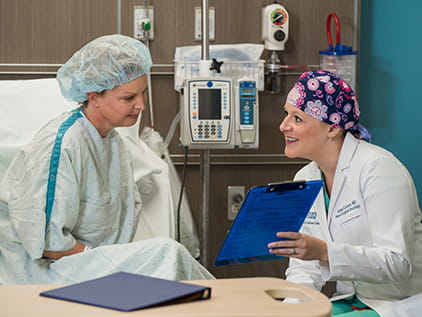Head and Neck Surgery
Head and neck surgery can be used to treat cancerous and noncancerous tumors in the head and neck, as well as tumors in the thyroid and parathyroid.
At The University of Kansas Health System, our physicians are nationally recognized leaders in the management of head and neck disorders. We provide the most progressive medical and surgical treatments available, including minimally invasive options.
What is head and neck surgery?
There are many different types of head and neck surgeries, depending on the condition(s) being treated. Our team of specialists can diagnose both minor and complex conditions and provide the most progressive medical treatments available.
Head and neck surgery often involves a number of procedures and covers a broad range of specialty areas.
We offer a variety of appointment types. Learn more or call 913-588-1227 to schedule now.
Who can have head and neck surgery?
When medication and other nonsurgical treatments have not been effective, surgery is the recommended treatment for people suffering from serious conditions affecting the head and neck.
How does head and neck surgery work?
A combination of treatments can work together to address head and neck diseases and conditions:

Cancer care you can count on
The University of Kansas Cancer Center is 1 of fewer than 60 NCI-designated comprehensive cancer centers in the nation, and it's part of The University of Kansas Health System.
Benefits and risks of head and neck surgery
Advanced surgery for head and neck conditions can improve your quality of life and may, in some cases, even save your life. As with any surgery, there is a potential risk for infection, scarring or not achieving the desired results. Your doctor will go over the risks and benefits of your surgery in detail before scheduling your procedure.
What happens during head and neck surgery?
The process your surgeon follows will be different for each person, depending on the specific condition that’s being treated. Generally, minimally invasive and robotic surgical techniques mean a shorter procedure time as well as a shorter and easier recovery compared to traditional open surgery.







